Best and Worst Cars of the 60's
For July's issue, we assembled the most important cars ever built, working forward from 1955, when we were founded as Sports Car Illustrated, and the modern auto industry came of age. These are Car and Driver's GOATS – the Greatest of All Time. Today: The Sixties.
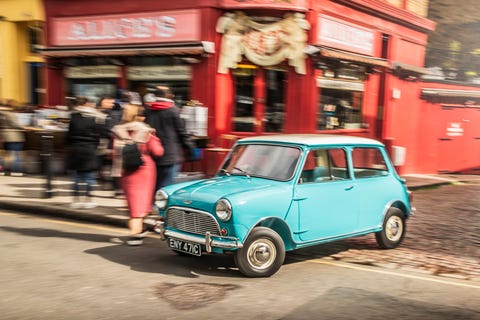
Charlie Magee Car and Driver
1960 Austin Mini
"I've always felt that stylists such as you have in America are ashamed of a car and are preoccupied with making it look like something else, like a submarine or an airship," Alec Issigonis told the New York Times in 1964 about his design for the Mini. "As an engineer, I revolt against this."
The 1960 Mini (originally called the 850 in the U.S.) was applied logic from an unconventional mind. To maximize interior space in a car that was only 10 feet long, Issigonis placed the 848-cc inline-four sideways with a four-speed manual in its sump. A unibody eliminated the need for a separate frame, with the light body suspended by rubber-cone springs over dinky 10-inch wheels. It was unlike anything else at the time and remarkably similar to today's cars and crossovers—conceptually, not dimensionally.
Then the Mini went racing and kicked ass. In tweaked Cooper S form, it won the Monte Carlo rally in 1964, 1965, and 1967. (It was robbed in 1966 when the Minis that finished in the top three spots were disqualified for noncompliant headlights.) Through the years, Minis have competed in just about every motorsport, except motocross and hydroplanes, and they now clog the grids at vintage races. Sold by Austin, Innocenti, BMC/British Leyland, Morris, Riley, and Wolseley, more than 5 million Minis were built before production stopped in 2000. —John Pearley Huffman
Values, market analysis, auction results, and more on the Classic Mini at Bring a Trailer.*
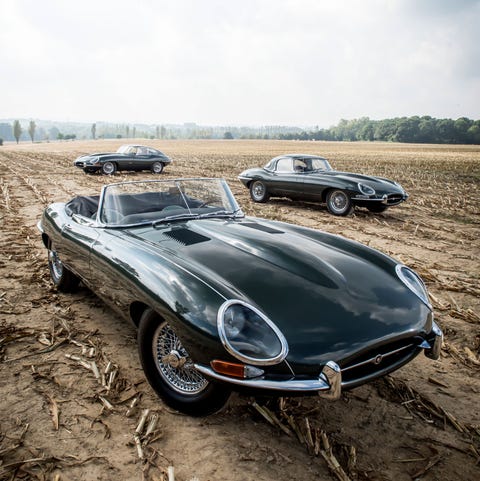
James Lipman Car and Driver
1961 Jaguar XK-E
The XK-E is the marquee dream car of its era because it's beautiful, but its beauty was incidental to its low-drag, high-speed function. The shape was penned by Jaguar aerodynamicist Malcolm Sayer. That striking body was draped over race-proven hardware that was ahead of its time in many ways, such that it's hard to believe this alleged 150-mph car is now nearly 60 years old. The husky burr from the DOHC inline-six no doubt influenced the great naturally aspirated BMW sixes, and its 265 horsepower is enough to make you glad for the confident bite of the four-wheel disc brakes (located inboard at the rear). The cabin, all needles and dials and toggle switches, exudes timeless cool. When it was new, we tested the E-type with a 2200-mile trip from New York to Detroit and back. We'd jump at the chance to do that again. —Ezra Dyer
Values, market analysis, auction results, and more on the Jaguar XKE Series I at Bring a Trailer.
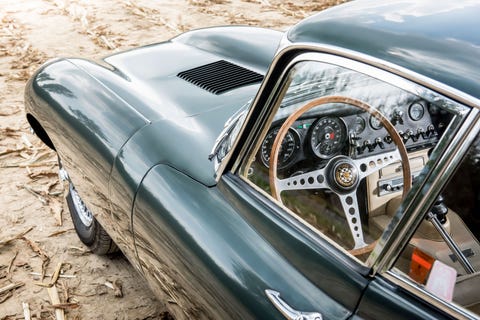
James Lipman Car and Driver
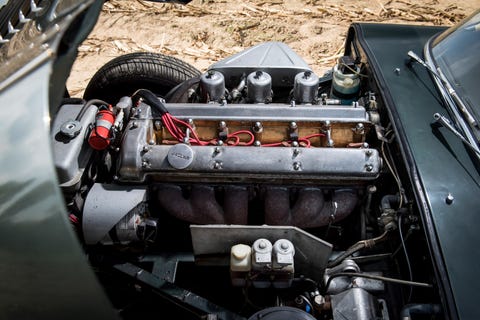
James Lipman Car and Driver
The E-type borrowed its 3.8-liter inline-six from the Jaguar XK-150 S. The wood-rimmed steering wheel with drilled aluminum spokes is nearly as artful as the body.
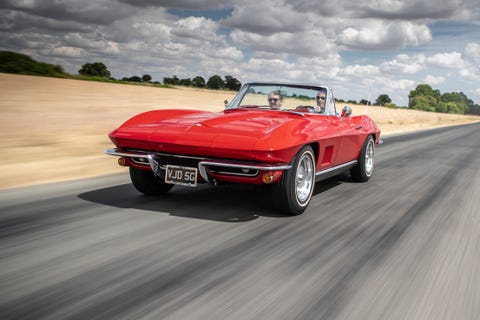
Charlie Magee Car and Driver
1963 Chevrolet Corvette Sting Ray
Imagine a rear-drive sports car powered by a high-revving 300-plus-hp V-8, riding on a sophisticated independent suspension, and dressed in a stunning body made from a lightweight material. If that sounds like a cool car today, imagine it on the road 57 years ago. That was the 1963 Corvette Sting Ray.
American cars of the early 1960s were lumbering, chrome-encrusted behemoths. The 1963 Sting Ray, the first of the second-generation (C2) Chevy two-seaters, was shockingly beautiful, lithe, nimble, and, of course, blindingly fast. The handiwork of engineer-racer Zora Arkus-Duntov and GM's flamboyant design czar, Bill Mitchell, the C2 was available as either a coupe or a convertible and wore feathery fiberglass body panels virtually free of chrome trim. In '63, top models came with a fuel-injected 327-cubic-inch small-block V-8 rated at 360 horsepower. With performance and handling that rivaled a Ferrari's, the C2 left its crude predecessor gasping. And it did so at a price that allowed average Americans to actually own one.
Sound familiar? The C2 established the price-value formula that Corvettes have followed ever since. It ran through the 1967 model year, but the C2's greatness has lasted to the present, enshrined in its collectibility: Concours-condition models can trade hands for hundreds of thousands of dollars. —Rich Ceppos
Values, market analysis, auction results, and more on the Corvette C2 at Bring a Trailer.
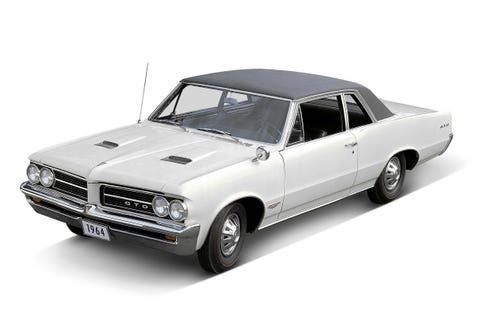
GM Heritage Operations
1964 Pontiac GTO
The GTO was so GOAT, people actually called it "the goat" even though the correct letters are only three-quarters present and in the wrong order. That's how inspirational it was. Historians, drunken pedants, and other contrarians will point out that the GTO was not the first application of the big-engine-in-mid-size-car formula, and they are—well, they're right. But who cares? It's not some laudable intellectual feat to take decades of historical perspective and make the observation Car and Driver did on our first encounter with the car.
"It was a shade over 10 years ago that events in Detroit took a turn for the better and started the trend that ultimately resulted in the Tempest GTO," we wrote in March 1964. "From those humble beginnings . . . came a host of better, more interesting cars from Detroit." It's not that the Oldsmobile Rocket 88 was too early, or that the Chrysler C-300 didn't burrow into the zeitgeist as readily as the GTO; they were steps along the way, helping to ripen 1964 as The Moment for the muscle car.
"[The GTO] does what so many others only talk about—it really does combine brute, blasting performance with balance and stability of a superior nature." —C/D, March 1964
The finishing touch was the audacity of those three letters on this car, or more likely, it was the audacious way the Tempest GTO delivered on that apparent overpromise. Yes, it was quick, but it stopped and handled, too. We called it "the best American car we have ever driven, and probably one of the five or six best cars in the world for the enthusiast driver." In case readers didn't take that seriously, we included this appraisal: "Our test car, with stock suspension, metallic brakes, and as-tested 348-hp engine, will lap any U.S. road course faster than any Ferrari street machine." And when we called it a bargain, we emphasized the word with italics. The competition emphasized the GTO's significance with an explosion of similar cars that consumed the national conscience for a decade. It took the triple hit of emissions controls, an oil embargo, and an industry-wide rethink of insurance standards to finally slow the trend. —Jared Gall
Values, market analysis, auction results, and more on the Pontiac GTO at Bring a Trailer.
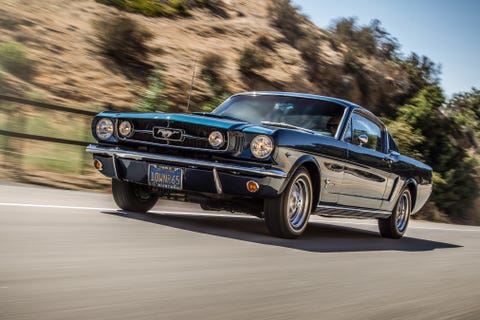
Charlie Magee Car and Driver
1965 Ford Mustang
The elements that make the Mustang iconic today—rear-wheel drive, optional V-8, low-slung two-door shape—are also what distinguish it from the comparatively humdrum sedans and crossovers that currently dominate the sales charts. But the Mustang that first hit the scene in the 1960s was similar in constitution to the popular mass-market cars of its day. It shared mechanical components with other Ford models such as the Falcon and Galaxie, and its sub-$2400 base price made it a remarkably accessible proposition.
What really made the Mustang special was what it represented to American car buyers: new possibilities for self-expression, driving enjoyment, and freedom. We were already obsessed with the idea of the car—any car—by this point, but owning a Mustang was something special. Immediately desirable upon its debut in April 1964, it invented a new class of "pony cars" that combined four-seater practicality with the performance and image of a sports car. It was a dream car the whole family could enjoy.
"It's easily the best thing to come out of Dearborn since the 1932 V-8 Model B roadster." —C/D, May 1964
It didn't matter much that most Mustangs were sold with unremarkable and underpowered inline-six and V-8 engines. The mere existence of an optional high-performance 289-cubic-inch engine at the top of the lineup, along with a long list of appearance and comfort extras, meant that any Mustang could be an aspirational vehicle.
Mustang Mania was a watershed moment for more than the Ford Motor Company. It inspired crosstown rival General Motors to come up with its own pony car. The Chevy Camaro's arrival in September 1966 kicked off a rivalry that persists to this day. We've argued over the merits of each for decades now and hope to do so for many more to come. But there's no denying that the Mustang started it all. —Joey Capparella
Values, market analysis, auction results, and more on the Ford Mustang at Bring a Trailer.
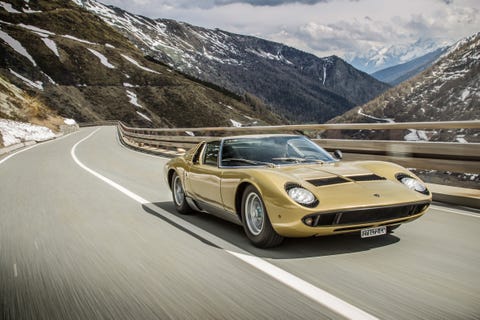
Charlie Magee Car and Driver
1966 Lamborghini Miura
What started as a side project and marketing exercise ultimately gave birth to the modern supercar. Designed by Bertone's Marcello Gandini, the Miura is a Botticelli brushstroke brought to life on top of clever engineering. Its eyelashed headlights, graceful waistline, and voluptuous fenders have, for decades, seduced writers into describing its beauty in human terms. Here's what we can say without hyperbole: The Miura radiates power and speed and drama even when it's parked.
A claimed top speed of 174 mph made it the fastest production car at the time. By transversely mounting the 345-hp V-12—with the gearbox integrated with the oil sump—behind the cabin, Lamborghini could keep the wheelbase shorter than if the engine were up front, instilling in the Miura an athleticism to match its looks.
This car has defined more than just Lamborghini; it introduced the concept of a mid-engine two-seater that combines forward-looking design and raw power. It pointed the way for every supercar since, and traces of its DNA can be found in everything from modern Ferraris to Corvettes. A remarkably impressive feat for a car with a production run of just 763. —Roberto Baldwin
Values, market analysis, auction results, and more on the Lamborghini Miura at Bring a Trailer.
1968 BMW 2002
But you can read all about this one in the David E. Davis Jr. classic, "Turn Your Hymnals to 2002."
Previously: The Fifties | Next: The Seventies
*Bring a Trailer is owned by Car and Driver's parent company, Hearst Autos.
This content is created and maintained by a third party, and imported onto this page to help users provide their email addresses. You may be able to find more information about this and similar content at piano.io
Best and Worst Cars of the 60's
Source: https://www.caranddriver.com/features/a32964167/the-greatest-cars-of-all-time-the-sixties/